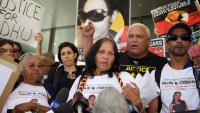The National Congress of Australia's First Peoples has called for prosecution of the people involved in the preventable death in custody of Yamatji woman, Ms Dhu. Last week, the Western Australian Coroner released CCTV footage that showed Ms Dhu’s lifeless body being dragged through South Hedland Police Station, two days after she was locked up for the non-payment of fines. The WA coroner had decided to release footage of the young Aboriginal woman who died in police custody, granting her grieving family their wishes.
Ms Dhu’s screams for help were ignored by police officers, who said they thought she was ‘faking’ it, while complications from a previous rib fracture became infectious and spread to her lungs.
The WA Coroner, Ros Fogliani, found police acted unprofessionally and inhumanely and her death could have been prevented if she had been given treatment.
But the National Congress of Australia's First Peoples is concerned the coroner’s findings fall short after there were no recommendations for prosecution.
“We call that there’s prosecution of these people, they have a duty of care and we felt that treatment was terrible,” Congress co-chair Rod Little said. “The footage actually showed how inhumane the treatment was of Ms Dhu, and those who we could see in the footage, these were people who were authorities that acted inappropriately and they should be held to account.”
Mr Little said it’s alarming that the officers involved are still employed.
But while the coroner’s lengthy findings handed down on Friday chastise the actions and attitudes of several police officers, and the failures of key medical staff, they stop short of apportioning blame for the individual or systemic disregard shown to Dhu in her final 45 hours of life.
"They also dismiss systemic racism as a factor in her death, despite finding that she was dismissed as a “junkie” who was “faking it” by most police officers, and despite finding that doctors succumbed to premature diagnostic closure and assumed her complaints to be “behavioural issues” caused by an unwillingness to be in custody."
“I came here hoping hoping for justice,” Dhu’s mother, Della Roe, said outside the Perth court where the findings were handed down. “And I still haven’t got it.”
Asked if police should face criminal charges over their treatment of Dhu, Police Commissioner Karl O’Callaghan said: “Police breached procedures but there’s been no criminality identified.”
The penalty for the 11 officers found to have breached police procedures was a letter, of varying sternness. At the inquest, several police who received the disciplinary letter said they did not understand what it meant.
Dhu’s family has instructed the Aboriginal Legal Service of WA to write to the director of public prosecutions to seek criminal charges.
Aboriginal Legal Service’s chief executive, Dennis Eggington, said Fogliani’s most significant recommendation was that the Western Australian government should legislate to end the practice of jailing people for fines, a practice that disproportionately affects Aboriginal women.
Fogliani said that if the government would not accept an outright ban it should require the decision to send someone to jail for unpaid fines be made by a magistrate, rather than by police.
Click here for archived WGAR News.



How mainstream media reported this
Ms Dhu inquest: Coroner criticises 'inhumane' WA police treatment before death in custody
The West Australian coroner has delivered a damning assessment of the treatment of an Aboriginal woman who died in custody.
Shocking footage of Ms Dhu released as family fights on
Harrowing footage of the final moments of Ms Dhu's life has been released after the 22-year-old's family won their fight to "show the world the truth" about how she was treated before her death in police custody.
Family will push for prosecution of those involved
Ms Dhu’s family will push for those involved in her "inhumane and unprofessional" treatment to be prosecuted after Coroner Ros Fogliani found her death could have been prevented if she had been treated with antibiotics.
Coroner: Ms Dhu's death preventable, police 'unprofessional and inhumane'
"She was treated in cruel and inhumane ways by those who had a duty of care to look after her, she was dismissed, ignored, neglected and denied her basic human rights."
Ms Dhu's inquest shines spotlight on failures but will it prompt change?
Recommendations include improved training on the duties of police charged with the care of detainees; improved cultural competency training; and localised, on-country training for officers in regional stations to be carried out by local Aboriginal people.
Premier Colin Barnett doesn't want jail time for unpaid fines
Premier Colin Barnett says he does not want people imprisoned for unpaid fines, but has stopped short of committing to the state coroner's recommendation for legislative change to rule out detention for fine defaulters.
Barnett: Dhu's death tough for police but 'should never have happened’
Barnett said police were dealing with a lot of aggression and were in a difficult situation in the lead-up to Ms Dhu's death. but her death should not have occurred. "I don't excuse or condone in any way what happened but we also need to have acknowledgment for the reality of the situation police were facing."
Coronial findings show importance of teaching doctors and nurses about unconscious bias
Public discussion about racism in Australia is often met with denial, discomfort and fragility. Shooting the messenger is a common reaction. Some stand with whistle blowers and defend their right to speak truth to power. Others completely deny racism’s existence, wishing it would go away because “we treat everyone the same”.
Recently here on Indymedia
Another Australian state has joined the growing indigenous treaties swell
Stop, reassess: no green light for Australian uranium sales to Ukraine
Misoxeny – Μίσος των ξένων – in today’s terms, a culmination of White Privilege in Australia
Appalling prison treatment of Aboriginal youth highlighted at Australian inquiry
Dylan Voller: ‘Young people need love and someone to talk to not (to) be locked in a cell’
Report on Aboriginal and Torres Strait Islander disadvantage shows alarming gaps in progression
Aboriginal owners construct ‘legal line of defence’ against Adani and Queensland government
Indigenous Kalgoorlie residents plan own legal action after landmark Palm Island court decision
“We were killed with impunity simply because of who we are”
More Aboriginal power? Or same old same old in the Northern Territory?
Barrier-Reef-trashing monster coal mine to get a billion dollar tax handout
Ongoing crimes against humanity, gross violations of human rights, genocide, ethnocide, ecocide and persecution across ‘Australia’
New Australian 'biodiversity' law 'a direct assault on Aboriginal laws, culture, religion and spirituality'
Is South Australia’s nuclear dumping plan dead?
Report calls for change in Indigenous suicide prevention in Australia
"Free speech" a “creep back to bigotry and racism”
Some federal politicians in the parliament elected in July are attempting to reform the section by removing the words “offend” and “insult”.
Labor Opposition senator and prominent Aborigine, Pat Dodson, said in a speech in the Senate that the debate is a “creep back to bigotry and racism”. “Nothing wrong with freedom, particularly if you are from the ruling class. There’s a hell of a lot wrong with freedom if you’ve got to battle to experience it, if you’ve got to fight for it.”
Now a peak Aboriginal health care organisation, has weighed into the debate arguing that racial vilification is a serious threat to health.
The National Aboriginal Community Controlled Health Organisation (NACCHO) says in a submission to a parliamentary inquiry into freedom of speech:
"NACCHO does not believe the operation of Part IIA of the Racial Discrimination Act 1975 (Cth) (the “RDA”) imposes unreasonable restrictions upon freedom of speech [taking into account the meaning given to that phrase in the Terms of Reference], or that sections 18C and 18D should be reformed. ...
"The link between self-reported perceptions or experiences of racism and poorer physical and mental health is established and the pathways from racism to ill-health are now well understood by health researchers. Racism and racial vilification experienced by Indigenous Australians is a widespread, serious and ongoing problem.
"Any weakening of current restrictions on freedom of speech will directly undermine and work in opposition to existing Government strategies for improving Aboriginal and Torres Strait Islander people’s health. Combating racial discrimination is a key strategy for closing the gap in health outcomes between Indigenous and non-Indigenous Australians and achieving the Australian Government’s vision for an Australian health system that is free of racism and inequality.
"In conclusion we wish to express our very profound concerns that the terms of reference for this inquiry appear to suggest that the right to freedom of speech is superior to the right to freedom from discrimination, in particular in the form of racist vilification. Freedom of expression is not an absolute right and preventing the serious harm caused by racist speech is of sufficient importance to warrant appropriate restrictions on freedom of speech as currently contained in sections 18C and 18D of the RDA."
----------------------------------------------------------------------------------------------------------------------------------------------------------------------------------
"Racial Discrimination Act works well"
The Racial Discrimination Act works well, says the Australian Human Rights Commission. However, it wants to conduct a free speech inquiry looking into media and internet regulation and defamation.
The Commission says the Act strikes an appropriate balance between freedom of speech and freedom from racial vilification and has challenged the government to allow a deeper dive into other restrictions used by powerful people to curb speech, such as defamation and media regulation.
The commission has used a new parliamentary inquiry into freedom of expression – an inquiry triggered by rolling political controversy about 18C of the RDA – to ask the government for a formal reference to conduct its own free speech inquiry, examining media and internet regulation, intellectual property and defamation laws.
Its president, Gillian Triggs, has faced months of trenchant attacks from senior government figures who contend that 18C represents an unreasonable curb on free speech. MPs, including the prime minister, Malcolm Turnbull, have also criticised the commission’s handling of race discrimination complaints.